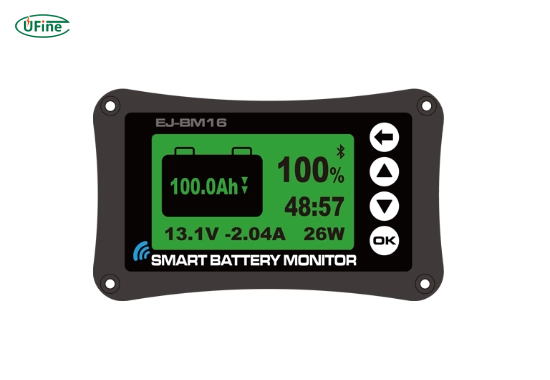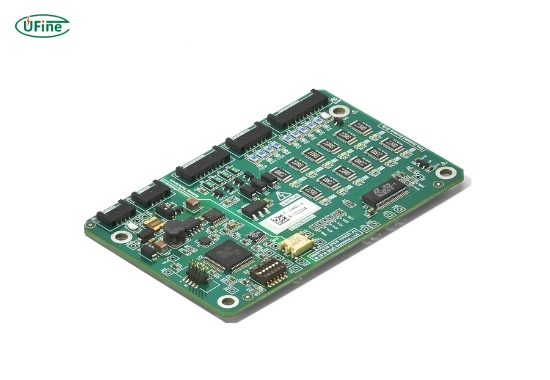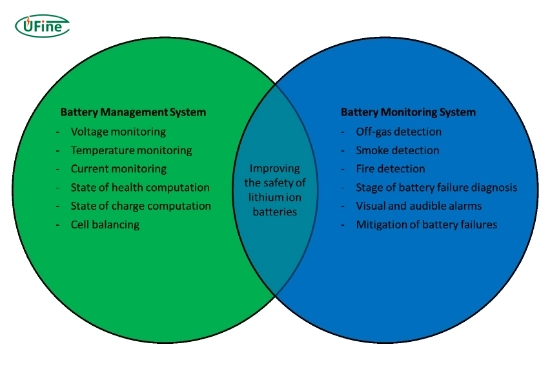
- Part 1. What is a battery monitor?
- Part 2. What is a battery management system (BMS)?
- Part 3. How does a lithium ion battery monitor work?
- Part 4. How does a battery management system work?
- Part 5. Key differences between a battery monitor and a BMS
- Part 6. Do you need both a battery monitor and a BMS?
- Part 7. What features to look for in a lithium ion battery monitor?
- Part 8. What features to look for in a battery management system?
- Part 9. Can a battery monitor replace a BMS?
- Part 10. Can a BMS display live battery data?
- Part 11. FAQs about battery monitor and battery management system
What is the difference between a battery monitor and a battery management system (BMS)? A lithium ion battery monitor and a battery management system are often confused. But they serve different purposes in managing battery performance. One focuses on monitoring, while the other handles control and protection. Understanding the difference is essential for anyone using lithium-ion batteries in solar systems, RVs, boats, or off-grid setups.
In this article, we’ll explore their functions, differences, and how they work together. This deep-dive guide will help you make smarter choices for your power system.
Part 1. What is a battery monitor?
A battery monitor is a device that displays real-time information about your battery’s status. Think of it like a fuel gauge for your battery system.
What does a battery monitor do?
Here’s what a lithium ion battery monitor typically shows:
- State of charge (SOC)
- Voltage and current
- Power usage
- Amp-hours consumed
- Time remaining until empty or full
These details help you understand how much energy is being used or charged. Some advanced monitors also track historical data and allow you to access info via smartphone apps.
Why is a battery monitor important?
A lithium ion battery monitor helps prevent overuse or deep discharge, which can shorten your battery’s life. With accurate data, you can optimize charging and improve energy efficiency.
Part 2. What is a battery management system (BMS)?
A battery management system is an electronic system that protects and controls a battery pack. It ensures safe operation and extends battery lifespan.
What does a BMS do?
A BMS performs several key functions:
- Monitors cell voltage, temperature, and current
- Balances cells to prevent overcharging or undercharging
- Disconnects the battery during unsafe conditions
- Communicates with other system components
It’s the brain of a lithium-ion battery pack, constantly checking each cell to prevent failure or fire.
Is a BMS optional?
No. A BMS is mandatory for lithium-ion batteries. Without it, the risk of overheating, cell damage, or even explosion increases. That’s why every lithium battery pack comes with a built-in or external BMS.
Part 3. How does a lithium ion battery monitor work?
A lithium ion battery monitor works by measuring voltage and current flow into and out of the battery. It uses a shunt resistor to do this.
What is a shunt?
A shunt is a small, precise resistor installed in the main negative cable of the battery. It measures the electrical current going in or out. The monitor calculates the battery’s state of charge based on this data.
Can a battery monitor work without a BMS?
Yes, but not safely. A battery monitor only shows data. It does not protect the battery. That’s what the BMS does. So, while a monitor is optional, a BMS is essential.
Part 4. How does a battery management system work?
The BMS is connected to each individual cell in a battery pack. It constantly checks if:
- Voltage is too high or low
- Temperature is out of range
- Charging or discharging current is too much
If any of these go beyond limits, the BMS disconnects the battery to prevent damage.
What happens during cell balancing?
Battery cells can become unbalanced over time. Some may charge faster than others. The BMS corrects this by:
- Draining energy from higher-charged cells
- Redirecting charge to lower-charged cells
This process is called cell balancing and helps maintain battery health.
Part 5. Key differences between a battery monitor and a BMS
Let’s break it down in a simple table:
| Feature | Battery Monitor | Battery Management System (BMS) |
|---|---|---|
| Main Role | Shows battery data | Protects and manages battery |
| Required for Operation? | No | Yes (for lithium-ion) |
| Controls Charging? | No | Yes |
| Controls Discharging? | No | Yes |
| Balances Cells? | No | Yes |
| Prevents Overcharge? | No | Yes |
| Prevents Over-discharge? | No | Yes |
As you can see, a battery monitor is for information, while a BMS is for protection.
Part 6. Do you need both a battery monitor and a BMS?
Yes, ideally. A BMS keeps your battery safe. But it doesn’t tell you what’s happening in real-time. That’s where a battery monitor comes in.
When should you use both?
If you’re using a lithium-ion battery bank in an RV, solar setup, or off-grid cabin, using both gives you:
- Peace of mind from protection (BMS)
- Insight and control from monitoring (battery monitor)
They work as a team. One guards the battery. The other keeps you informed.
Part 7. What features to look for in a lithium ion battery monitor?
When choosing a battery monitor, look for:
- High accuracy shunt
- Bluetooth connectivity
- App support (iOS/Android)
- History tracking
- Alarm settings
- Easy installation
Some popular models include Victron BMV-712 and Renogy Battery Monitor.
The more accurate your battery monitor, the better decisions you can make about power usage.
Part 8. What features to look for in a battery management system?
Not all BMS units are the same. For a quality lithium-ion battery, choose a BMS that offers:
- Over-voltage protection
- Under-voltage protection
- Temperature monitoring
- Cell balancing
- Short-circuit protection
- Communication protocols (CAN, RS485, Bluetooth)
Smart BMS systems can connect with your solar charge controller or inverter for advanced control.
Part 9. Can a battery monitor replace a BMS?
No, a battery monitor cannot replace a BMS.
A monitor is like your car’s dashboard. A BMS is the engine control system. They do different jobs. Replacing one with the other can lead to battery damage or safety hazards.
Part 10. Can a BMS display live battery data?
Some modern BMS units offer basic data via Bluetooth or serial ports. But this is often limited. Most users prefer a separate battery monitor for:
- Detailed SOC readings
- User-friendly displays
- Historical data analysis
So while a BMS may show some data, a monitor gives you the full picture.
Part 11. FAQs about battery monitor and battery management system
Can I use a lithium ion battery without a BMS?
No. A BMS is mandatory for safe operation of lithium-ion batteries. It prevents overcharge, over-discharge, and overheating.
Is a battery monitor accurate?
Yes, if it’s properly installed with a quality shunt. Accuracy can be over 99% for good models.
What happens if the BMS fails?
If the BMS fails, the battery may overheat, catch fire, or become permanently damaged. Always use a reliable BMS.
Do lead-acid batteries need a BMS?
No. Lead-acid batteries don’t have individual cells like lithium batteries, so they don’t need a BMS. But they still benefit from monitoring.
Can I install the battery monitor myself?
Yes. Most battery monitors are DIY-friendly with basic tools. Just connect the shunt to the battery’s negative terminal and follow the manual.
Related Tags:
More Articles

What are Watts and Watt Hours in Battery?
Understand watt vs watt-hour in batteries, how to calculate battery watt hours, and what Wh means for car batteries, devices, and energy storage.
A Complete Guide to the Best Batteries for Flashlights
Compare the best batteries for flashlights, including AA, AAA, 18650, 21700, CR123A. See which battery offers the best brightness, runtime, and reliability.
How Long Do Rechargeable AA Batteries Last?
How long do rechargeable AA batteries last? Compare NiMH and lithium AA lifespan, recharge cycles, key factors, and performance vs alkaline batteries.
How Much Current Can a 9V Battery Really Supply?
Discover how many amps a 9V battery can supply, its actual current output, discharge rate, and capacity for alkaline, lithium, and rechargeable 9V batteries.
12V STD vs 12V AGM: Meaning, Differences, and Which Is Better
Understand what STD and AGM batteries mean, their key differences, and which 12V battery fits your needs best in 2026.





